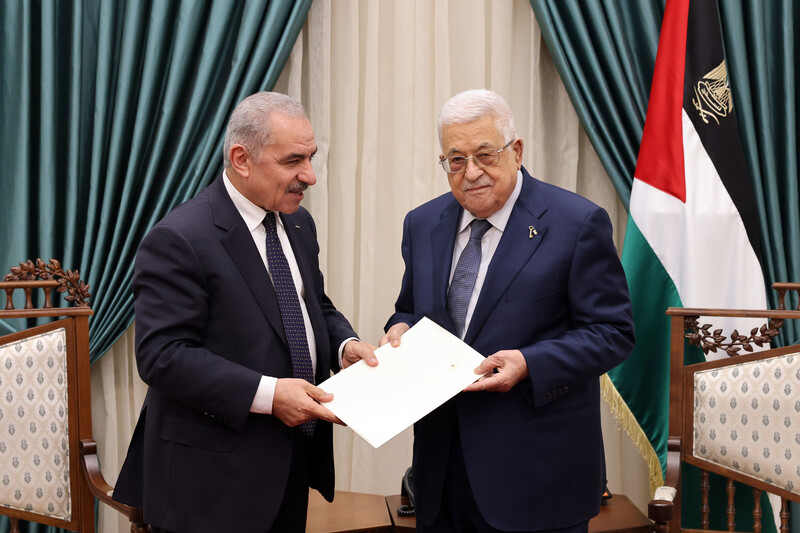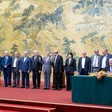Power Suits 26 March 2024

Former Palestinian Authority prime minister Mohammad Shtayyeh hands his letter of resignation to PA leader Mahmoud Abbas on 26 February, 2024.
APA imagesAt the end of February, representatives of Palestinian political factions met in Moscow to discuss the formation of a unified government in a first attempt at a coordinated Palestinian political response to Israel’s genocide in Gaza.
It was a positive meeting by all accounts, even with the participation of both Fatah and Hamas, the two main factions, who have been at loggerheads since 2007.
Mustafa Barghouti, head of the Palestinian National Initiative, said he had “never seen the atmosphere so close to unity.”
It only took two weeks, however, before the two factions were back at each other’s throats.
Such a rapid descent into mutual recrimination suggests that any kind of real reconciliation is still a long way off, and lays bare the paucity of vision and legitimacy of the current generation of Palestinian leaders and politicians.
The Moscow parley had followed on the heels of the resignation of the West Bank-based Palestinian Authority government led by Mohammed Shtayyeh, a move that was widely seen as the PA’s first attempt at making any significant moves to adapt to the new reality.
But it was followed by the announcement on 14 March of the appointment of Muhammad Mustafa, an economist, a close ally of Palestinian Authority leader Mahmoud Abbas, and the former head of the Palestine Investment Fund, as new prime minister.
That announcement brought a sharp retort from Hamas, who denounced what it called a “unilateral” decision.
“Making individual decisions and engaging in superficial and empty steps such as forming a new government without national consensus only reinforces a policy of unilateralism and deepens division,” the movement said in a statement.
Inexcusable
This seemed to take Fatah by surprise.
According to one Palestinian official, speaking to The Electronic Intifada on condition of anonymity, the faction thought that Mustafa – who helped oversee reconstruction in Gaza after Israel’s 2014 onslaught – would not prove contentious.
“It was coordinated [with all other factions],” the official claimed.
Fatah – which is headed by Mahmoud Abbas – responded somewhat childishly that Hamas had not consulted it before it launched its 7 October “adventure.”
Inexcusably, it then blamed Hamas for Israel’s genocide.
Those “who were responsible for the return of the occupation to Gaza Strip and caused the Nakba which our Palestinian people live… have no right to dictate national priorities,” Abbas’ faction said in a statement on 15 March.
Rarely can any political statement by any Palestinian faction at any time have been so gormless.
Even the official contacted by The Electronic Intifada conceded that the statement was “appalling.”
And it bolsters yet again those who say the Abbas era must come to an end sooner rather than later.
It is not that the Palestinian public, according to opinion polls, overwhelmingly feels the 7 October operation was justified.
It is not that Hamas is twice as popular as Fatah and would win any parliamentary elections if held now by 30 percent to Fatah’s 14; or that two thirds of the Palestinian public think that the PA has become a burden on the Palestinian people; or even that Abbas would lose a presidential election to any and all conceivable candidates, whether from Hamas, from his own party or even to independents.
It is that the Palestinian Authority under Abbas has overseen only division, humiliation and retreat in 19 years, during which it has followed a strategy – if it can be called that – of relying completely on support from the same countries who are now aiding Israel’s genocide in Gaza.
And it must end.
Clean sweep
In some ways the Palestinian division has been clarifying.
It showed that even with the near total subjugation of the occupied West Bank, including PA-Israeli security collaboration that simply allowed Israel’s occupation to consolidate unopposed, Israel’s overall strategic aim remained the same: blocking any and all pathways to Palestinian liberation.
The West Bank only saw more settlements, less living space, a brutal apartheid system of rule, a constant narrowing of any political horizon, amounting to a slow genocide. All aided and abetted by Israel’s allies and sponsors.
And the refusal to play along in Gaza?
Isolation, impoverishment, imprisonment, military brutality and neglect. All aided and abetted by Israel’s allies and sponsors.
It’s hard, of course, to devise a successful strategy when confronted with an unaccountable Israeli oppressor wielding all the might of a modern military against a largely defenseless civilian population while enjoying the absolute support of the world’s richest and most powerful countries.
But that is the reality facing the Palestinian people.
And it is one Palestinian leaders need to face up to immediately.
At a time when global popular opinion and the vast majority of the world’s countries have swung solidly behind Palestinians and their struggle for justice – an apartheid South Africa moment, if you like – Palestinian leaders simply cannot afford division.
Unable to hold elections in the short term, there is no other answer for now than to reconstitute the Palestine Liberation Organization in such a way that it includes all factions – including Hamas and Islamic Jihad who have yet to be admitted into that club – as well as representatives of the Palestinian diaspora, while placing the PA firmly under its collective governance.
This can be done in short order, given the political will.
And it has to be done in spite of inevitable opposition from countries like the US and the UK to any participation of what they consider terrorist groups.
Relying on countries that are complicit in Israel’s genocide – slow or fast – is a dead end, as has been amply demonstrated over many decades.
And it is up to Palestinians to put their house in order in a way that suits them and that represents the popular will as much as possible under the circumstances.
This necessitates a clean sweep of the current West Bank leadership, which has had its time and needs to make way. Abbas and his loyalists are uninspiring, unpopular and have been largely absent for the past six months.
In Moscow, it was left to Russian foreign minister Sergei Lavrov to remind the Palestinian representatives, quoting Jesus, that a “house divided against itself will not stand.”
Palestinians need and deserve a unified leadership that can harness the momentum created by the massive wave of pro-Palestinian sentiment across the globe over the past six months.





Comments
If Abbas cares about
Permalink Hassan replied on
If Abbas cares about Palestinians, he'll do the right thing and step down. The PLO badly needs to be revitalised, and this could include things like the above, equal representation of all factions, reconciliation (reflecting on and learning from past mistakes), no involvement of imperialist countries, and putting aside some political differences for sake of national unity.
EI and others have said the
Permalink Terry replied on
EI and others have said the same re the plo. My understanding, was that the plo was not only originally fairly conservative, but also used as a way to try controlling Palestinian discontent. Therefore, should we not be asking if its even redeemable to begin with ?